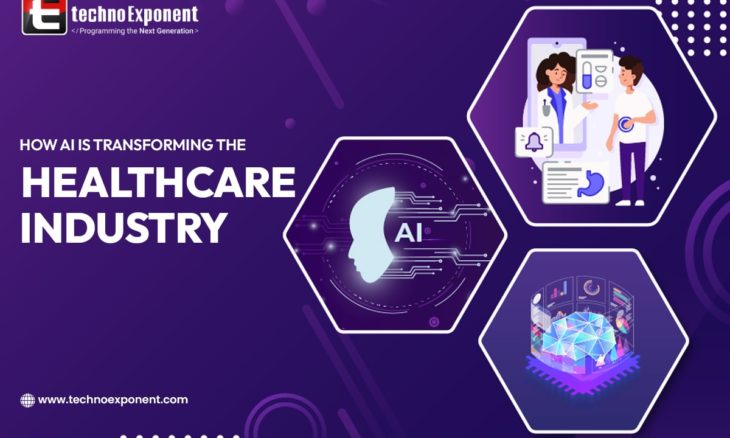
Healthcare, once characterized by stethoscopes and prescription pads, is now undergoing a profound transformation, thanks to Artificial Intelligence (AI). The integration of AI in healthcare is not just a technological advancement; it’s a revolution that promises to enhance patient care, streamline operations, and revolutionize the industry as a whole.
This blog explores the ways AI is transforming the healthcare industry for the better.
The Power of Predictive Analytics
AI excels in handling and analyzing vast amounts of data, and healthcare is no exception. One of the most significant impacts of AI in healthcare is predictive analytics. By analyzing historical patient data, AI can forecast disease outbreaks, identify patients at risk, and improve early diagnosis. This proactive approach can save lives and significantly reduce healthcare costs.
Improving Patient Care with Personalized Medicine
AI is ushering in the era of personalized medicine, a revolutionary approach that tailors treatment plans to individual patients.
By analyzing genetic, clinical, and lifestyle data, AI algorithms can determine the most effective treatment options for each patient, reducing adverse reactions and increasing the likelihood of successful treatment.
Enhancing Medical Imaging and Diagnosis
AI-powered medical imaging has taken radiology and diagnostic procedures to the next level. Advanced ML algorithms can detect abnormalities in X-rays, MRIs, and CT scans more accurately and quickly than human radiologists.
This not only leads to faster diagnoses but also reduces the chances of misdiagnosis.
Streamlining Administrative Tasks
The healthcare system is bogged down by administrative tasks, including billing and record-keeping. AI has made substantial inroads in automating these processes, saving time and reducing errors. This administrative efficiency allows healthcare professionals to focus more on patient care.
Robotics and Remote Surgery
Robotic surgery systems, controlled by AI, have made it possible for surgeons to perform intricate procedures with precision and less invasiveness. Moreover, AI-driven telemedicine has expanded access to healthcare in remote areas, connecting patients with specialists across the globe.
Chatbots and Telehealth Services
The integration of AI chatbots in healthcare has been pivotal in providing round-the-clock patient support and improving accessibility. Patients can receive immediate responses to health-related inquiries, schedule appointments, and even receive medication reminders. AI-backed telehealth services have expanded healthcare access, reaching a broader and more diverse range of patients due to their convenience.
Securing Health Information
Protecting sensitive health information is of paramount importance in the healthcare industry. AI has a significant role in enhancing cybersecurity. Advanced AI algorithms can detect and respond to cybersecurity threats in real-time, ensuring that patient data remains secure.
With the increasing threat of cyberattacks, AI has become an indispensable tool in safeguarding patient privacy.
Enhancing Drug Discovery
AI is also accelerating drug discovery by sifting through vast datasets to identify potential candidates for new medications. This speedier process can bring life-saving drugs to market more quickly and efficiently.
Enhancing the Patient Experience
AI-powered chatbots and virtual assistants are improving the patient experience by providing immediate responses to inquiries and assisting with appointment scheduling. These virtual agents reduce waiting times and free up healthcare staff for more critical tasks.
AI Ethics and Patient Consent
As AI continues to permeate healthcare, ensuring ethics and patient consent is a priority. It is essential to strike the right balance between AI utilization and patient privacy. Patients must be informed and give explicit consent for their data to be used for AI-powered healthcare applications.
Addressing these ethical concerns is critical for building trust and ensuring the responsible use of AI in healthcare.
Fighting Pandemics and Epidemics
The COVID-19 pandemic highlighted the crucial role of AI in disease surveillance, tracking, and prediction. AI can quickly analyze data from multiple sources to detect emerging trends and respond promptly.
Challenges and Concerns
While AI is a boon to the healthcare industry, it is not without challenges. Concerns about data privacy, ethical considerations, and potential job displacement should be addressed. Regulatory frameworks and industry standards will play a vital role in ensuring the responsible use of AI in healthcare.
The Future of AI in Healthcare
The future of AI in healthcare is promising. As technology continues to evolve, we can expect even more significant advancements. AI-powered wearable devices, real-time health monitoring, and seamless interoperability between healthcare systems are on the horizon. With AI, the healthcare industry is well-positioned to become more accessible, efficient, and patient-centric.
Final Words
To conclude, AI’s transformative influence on healthcare is undeniable. From predictive analytics to personalized medicine and improved diagnostics, AI is a game-changer.
As it continues to evolve, it promises to make healthcare more efficient, cost-effective, and accessible, ultimately improving patient care and health outcomes. While we address the challenges and concerns along the way, the prospects for AI in healthcare are incredibly bright.
AI is not just changing the healthcare industry; it’s revolutionizing it for the better.
 +44 141 628 8980
+44 141 628 8980
 (786) 269-2247
(786) 269-2247
 +61 872007153
+61 872007153
 +91 8900027268 (Sales only)
+91 8900027268 (Sales only)








